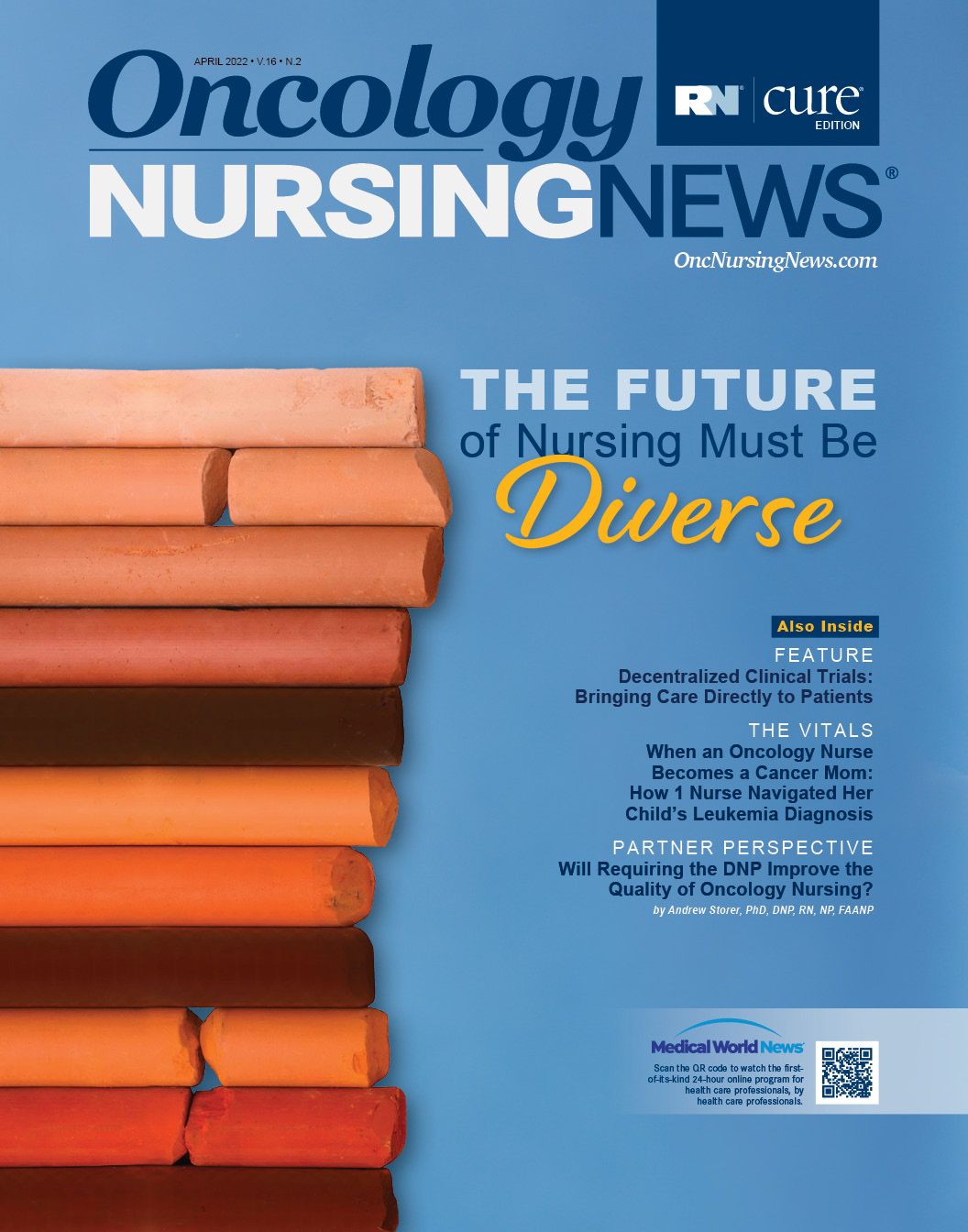Questions of Accessibility and Inclusion Continue to Draw Attention in Oncology Nursing
No system can properly flourish without constant efforts to diversify, and the nursing field is no exception.
No system can properly flourish without constant efforts to diversify, and the nursing field is no exception. In this issue, our cover story takes a hard look at the current statistics regarding diversity in nursing and provides some clear perspectives on how these numbers impact patient outcomes. In addition, our Medical Economics® column piggybacks off the question of equity by raising awareness about how the language of electronic health records may unin- tentionally help perpetuate implicit biases.
Inclusion and accessibility walk hand in hand. Our feature story delves into newly launched “decentralized clinical trials” that represent a novel approach to bringing cancer treatment to the patient. In this initiative, patients will be provided with virtual treatment options to make their therapy more accessible, as well as to improve clinical trial enrollment and retention.
Moreover, our Nurse’s Note addresses the concept of total pain. Patricia Jakel, MN, RN, AOCN, a clinical nurse specialist in the Solid Tumor Program at University of California Los Angeles (UCLA) Santa Monica Medical Center in California and co–editor-in-chief of Oncology Nursing News®, presents a case study on total pain management, concluding that although addressing patients’ physical discom- fort may be obvious, it can be easy to neglect the psychological pain they are simultaneously experiencing. Jakel argues that it is the responsibility of oncology nurses to be mindful of the full scope of pain a patient is undergoing to provide them with the necessary care.
Similarly, this issue’s episode of The Vitals includes a conversation with Janice Post-White, PhD, RN, FAAN. Post-White continues the discussion on emotional and psychological pain by addressing how she balanced working as an oncology nurse through her child’s cancer diagnosis.
By sharing lessons learned from her experience, Post-White reflects on some of the inter- sections of her professional and personal life and offers advice for those processing their own grief in the wake of cancer.
As always, we strive to keep you informed of the most relevant changes in the field of oncology. In this issue, we feature the recent approvals of tebentafusp-tebn (Kimmtrak) and pacritinib (Vonjo). Tebentafusp was approved in January 2022 for the indication of patients with unresectable or metastatic uveal melanoma in adult patients whose disease harbors HLA-A*02:01 and represents the first FDA-approved therapy to treat this patient population. Pacritinib received accelerated approval in February 2022 for the treatment of adult patients with intermediate-or high-risk primary or secondary (post-polycythemia vera or post-essential thrombocythemia) myelofi- brosis and severe thrombocytopenia (platelet counts less than 50 × 109/L). Regular approval will be contingent on findings from the newly launched PACIFICA trial (NCT03165734).
Moreover, our Clinical Insights column provides a quick snapshot of practice-changing research presented at the 2022 Gastrointestinal (GI) and Genitourinary (GU) Cancers Symposiums. Data from the GI Cancers Symposium highlighted the efficacy with checkpoint inhibitors in biliary tract cancer. Kristin E. Barber, APRN, AOCNP, FNP-BC, a nurse practitioner of GI Oncology at Huntsman Cancer Institute and Hospital with the University of Utah, offers some insights into the significance of the phase 3 TOPAZ-1 trial (NCT03875235) and what the findings could represent for this patient population. Also in this meeting, immunotherapy repeatedly outperformed chemotherapy in select gastric/gastroesophageal junction adenocarcinoma, and high response rates were observed among patients with BRAF V600E– mutant metastatic colorectal cancer who received a triplet regimen of nivolumab, encorafenib, and cetuximab. Another notable outcome included an observed positive relationship between ivosidenib (Tibsovo) and maintained quality of life in cholangiocarcinoma. This year’s GU Cancers Symposium included data showing potential for PARP inhibitors as the new frontline treatment in patients with metastatic castration-resistant prostate cancer with homologous recombination repair gene alterations. Other key takeaways show that immunotherapy combinations are linked with improved quality of life in advanced renal cell carcinoma, that darolutamide (Nubeqa) prolongs overall survival in select patients with prostate cancer, and that enfortumab vedotin (Padcev) shows promise in cisplatin-ineligible muscle-invasive bladder cancer.
As we all well know, comprehensive cancer care includes addressing indirect complications—our Adverse Event Report highlights research demonstrating that using bioimped- ance spectroscopy instead of a tape measure yields more accurate signs of lymphedema in breast cancer survivors. Coupled with early intervention with a compression sleeve, these findings could play a vital role in reducing the number of survivors who need to endure chronic breast cancer–related pain, explains Sheila Ridner, PhD, RN, FAAN, research professor of Nursing at Vanderbilt University School of Nursing in Nashville, Tennessee, in an interview with Oncology Nursing News®.
Our Advanced Practice Providers page addresses another common component
of cancer care: bone marrow transplant. Elizabeth Boateng, MSN, RN, FNP-BC, OCN, of Hackensack Meridian John Theurer Cancer Center in New Jersey, provides an overview of important safety considerations for oncology nurses to consider when caring for immunocompromised patients with hematologic malignancies.
Lastly, as advocacy and opposition continue to grow regarding the National Organization of Nurse Practitioner Faculties’ goal of requiring the doctor of nursing practice degree (DNP) as entry level for nurse practioner practice, Andrew Storer, PhD, DNP, RN, NP, FAANP, of Roswell Park Comprehensive Cancer Center in Buffalo, New York, highlights arguments for and against the requirement, offering his opinion on whether this requirement can improve the quality of care that oncology nursing brings to the field.

Innovative Program Reduces Nurse Turnover and Fosters Development
Published: September 12th 2024 | Updated: September 12th 2024The US Oncology Network (The Network) has developed one of the most comprehensive programs in the nation to support the professional development and retention of new oncology nurses.


